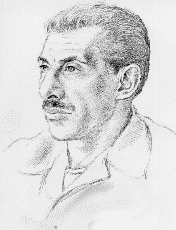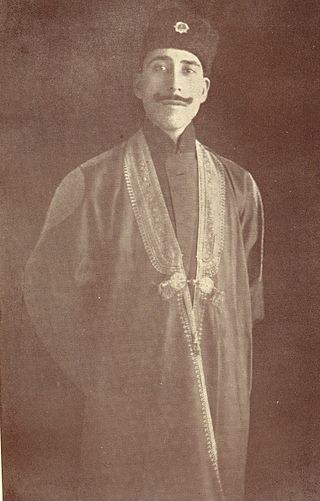
Sufism, also known as Tasawwuf, is a mystic body of religious practice found within Islam which is characterized by a focus on Islamic purification, spirituality, ritualism, asceticism and esotericism. It has been variously defined as "Islamic mysticism", "the mystical expression of Islamic faith", "the inward dimension of Islam", "the phenomenon of mysticism within Islam", the "main manifestation and the most important and central crystallization" of mystical practice in Islam, and "the interiorization and intensification of Islamic faith and practice".

A tariqa is a school or order of Sufism, or specifically a concept for the mystical teaching and spiritual practices of such an order with the aim of seeking haqiqa, which translates as "ultimate truth".

Idries Shah, also known as Idris Shah, né Sayed Idries el-Hashimi and by the pen name Arkon Daraul, was an Afghan author, thinker and teacher in the Sufi tradition. Shah wrote over three dozen books on topics ranging from psychology and spirituality to travelogues and culture studies.
Islamic studies refers to the academic study of Islam, and generally to academic multidisciplinary "studies" programs—programs similar to others that focus on the history, texts and theologies of other religious traditions, such as Eastern Christian Studies or Jewish Studies but also fields such as —where scholars from diverse disciplines participate and exchange ideas pertaining to the particular field of study.
In Islam, Barakah or Baraka is a blessing power, a kind of continuity of spiritual presence and revelation that begins with God and flows through that and those closest to God.

The Naqshbandi is a major Sunni order of Sufism. Its name is derived from Baha-ud-Din Naqshband Bukhari. Naqshbandi masters trace their lineage to the Islamic prophet Muhammad through Abu Bakr, the first Caliph of Sunni Islam and Ali, the fourth Caliph of Sunni Islam. It is because of this dual lineage through Ali and Abu Bakr through the 6th Imam Jafar al Sadiq that the order is also known as the "convergence of the two oceans" or "Sufi Order of Jafar al Sadiq".

A dargah is a shrine or tomb built over the grave of a revered religious figure, often a Sufi saint or dervish. Sufis often visit the shrine for ziyarat, a term associated with religious visitation and pilgrimages. Dargahs are often associated with Sufi eating and meeting rooms and hostels, called khanqah or hospices. They usually include a mosque, meeting rooms, Islamic religious schools (madrassas), residences for a teacher or caretaker, hospitals, and other buildings for community purposes.

The Qadiriyya are members of the Sunni Qadiri tariqa. The tariqa got its name from Abdul Qadir Gilani, who was a Hanbali scholar from Gilan, Iran. The order relies strongly upon adherence to the fundamentals of Sunni Islamic law.
Henry Corbin was a French philosopher, theologian, and Iranologist, professor of Islamic studies at the École pratique des hautes études. He was influential in extending the modern study of traditional Islamic philosophy from early falsafa to later and "mystical" figures such as Suhrawardi, Ibn Arabi, and Mulla Sadra Shirazi.

Nafs (نَفْس) is an Arabic word occurring in the Quran, literally meaning "self", and has been translated as "psyche", "ego" or "soul". The term is cognate with the Hebrew word nephesh, נֶפֶשׁ. In the Quran, the word nafs is used in both the individualistic and collective sense, indicating that although humanity is united in possessing the positive qualities of a nafs, they are individually responsible for exercising the agencies of the "free will" that it provides them.
William Clark Chittick is an American philosopher, writer, translator and interpreter of classical Islamic philosophical and mystical texts. He is best known for his work on Rumi and Ibn 'Arabi, and has written extensively on the school of Ibn 'Arabi, Islamic philosophy, and Islamic cosmology. He is a Distinguished Professor in the Department of Asian and Asian American Studies at Stony Brook University.

Sufi philosophy includes the schools of thought unique to Sufism, the mystical tradition within Islam, also termed as Tasawwuf or Faqr according to its adherents. Sufism and its philosophical tradition may be associated with both Sunni and Shia branches of Islam. It has been suggested that Sufi thought emerged from the Middle East in the eighth century CE, but adherents are now found around the world.

In Islamic philosophy, Sufi metaphysics is centered on the concept of وحدة, waḥdah, 'unity' or توحيد, tawhid. Two main Sufi philosophies prevail on this topic. Waḥdat al-wujūd literally means "the Unity of Existence" or "the Unity of Being." Wujūd, meaning "existence" or "presence", here refers to God. On the other hand, waḥdat ash-shuhūd, meaning "Apparentism" or "Monotheism of Witness", holds that God and his creation are entirely separate.

A khanqah or khangah, also known as a ribat (رباط), is a building designed specifically for gatherings of a Sufi brotherhood or tariqa and is a place for spiritual practice and religious education. The khanqah is typically a large structure with a central hall and smaller rooms on either side. Traditionally, the kahnqah was state-sponsored housing for Sufis. Their primary function is to provide them with a space to practice social lives of asceticism. Buildings intended for public services, such as hospitals, kitchens, and lodging, are often attached to them. Khanqahs were funded by Ayyubid sultans in Syria, Zangid sultans in Egypt, and Delhi sultans in India in return for Sufi support of their regimes.

In Sufism, maʿrifa is the mystical understanding of God or Divine Reality. It has been described as an immediate recognition and understanding of the true nature of things as they are. Ma'rifa encompasses a deep understanding of the ultimate Truth, which is essentially God, and extends to the comprehension of all things in their connection to God. Sufi mystics attain maʿrifa by embarking on a spiritual journey, typically consisting of various stages referred to as "stations" and "states." In the state of ma'rifa, the mystic transcends the temptations of the self and is absorbed in God, experiencing a sense of alienation from their own self.

Sirdar Ikbal Ali Shah was an Indian-Afghan author and diplomat descended from the Sadaat of Paghman. Born and educated in India, he came to Britain as a young man to continue his education in Edinburgh, where he married a young Scotswoman.

The Uwaisī, Silsila or Tariqa (pathway) is a form of spiritual transmission in the vocabulary of Islamic mysticism, named after Owais al-Qarani. It refers to the transmission of spiritual knowledge between two individuals without the need for direct interaction between them. The term Uwaisīyaan refers to those Sufis who have gained the Sufi spiritual chain from another Sufi without physically meeting them in this world. It can refer to a school of Sufism, and its singular form, Uwaisi, refers an individual who is a Sunni Muslim.

Sufism has a history in India evolving for over 1,000 years. The presence of Sufism has been a leading entity increasing the reaches of Islam throughout South Asia. Following the entrance of Islam in the early 8th century, Sufi mystic traditions became more visible during the 10th and 11th centuries of the Delhi Sultanate and after it to the rest of India. A conglomeration of four chronologically separate dynasties, the early Delhi Sultanate consisted of rulers from Turkic and Afghan lands. This Persian influence flooded South Asia with Islam, Sufi thought, syncretic values, literature, education, and entertainment that has created an enduring impact on the presence of Islam in India today. Sufi preachers, merchants and missionaries also settled in coastal Gujarat through maritime voyages and trade.
International Association of Sufism (IAS) is a California nonprofit organization headquartered in Marin County. It is a United Nations' NGO/DPI and the first organization established to organize an inclusive forum that opens a line of communication among Sufis all around the world. IAS launched a global intra-faith movement among Sufis and Sufi Schools reaching from the borders of Indonesia to the Coasts of West Africa.
Nahid Angha is an Iranian-American Sufi scholar, author, lecturer and human rights activist, with a focus on women’s rights. She is the co-director and co-founder of the International Association of Sufism (IAS), founder of the International Sufi Women Organization, the executive editor of Sufism: An Inquiry. Nahid Angha is the main representative of the IAS to the United Nations.




